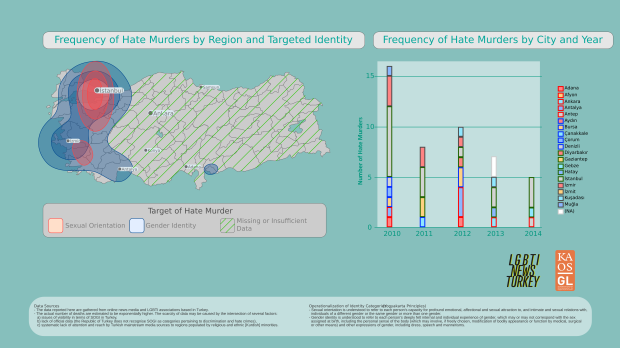Between January 2010 and November 2014, 47 individuals have been killed due to their real or perceived sexual orientation or gender identity. These deaths are represented in the infographic below (pdf, source, license), with data collected by LGBTI News Turkey volunteers from various online news media and LGBTI associations.
It is important to note that these figures point to the lack of information regarding a significant part of Turkey. This scarcity of data may be caused by the intersection of several factors:
a) Issues of visibility in terms of sexual orientation and gender identity (SOGI) in Turkey,
b) Lack of official data (the Republic of Turkey does not recognise SOGI as categories pertaining to discrimination and hate crimes),
c) Systematic lack of attention and reach by Turkish mainstream media sources to regions populated by religious and ethnic [Kurdish] minorities.
The rights violations against LGBT individuals in Turkey, i.e. the “numbers” on our infographic, is part of a general trend of violence in Turkey that is maintained and encouraged by the Turkish state’s language of discrimination and hatred, especially towards women. On 24 November 2014, Turkey’s President Recep Tayyip Erdoğan’s put forth his thoughts on gender equality and said, “You cannot bring women and men into equal positions; that is against nature because their nature is different”. Erdoğan has previously remarked that women should have 3 children and has proposed plans to limit abortions and Caesarean sections.
The Turkish state’s and its leaders’ encroachment on women’s bodies and reproductive rights is built upon an ideal of morality, leading to increased conservatism and social polarization. The notion of traditional family, with its normative and hegemonic sexual and gender roles, is seen as one of the main pillars of moral life.
Within this suffocating atmosphere of so-called “public morality”, LGBT individuals are marginalised and perceived as “perverse”. Between 2010 and 2014, representatives of the Turkish government had the following thoughts to share:
- In 2010, former State Minister of the Affairs of Women and Families, Aliye Kavaf, stated that she believes “homosexuality is a biological disorder, a disease … something that needs to be treated”.
- In a 2011 speech on terrorism, former Minister of the Interior Idris Naim Sahin spoke disparagingly of “an environment in which there are all sorts of immorality, indecency and inhuman situations – from pork meat to … homosexuality”.
- In 2012, Ankara mayor and member of the ruling Justice and Development Party Melih Gökçek spoke of homosexuality as contrary to Turkish culture; he remarked, “Each society has its own moral values. Especially for our Turkish society, it is not possible for us to be together with the gay culture in Europe. It is also not possible to approve of this. How we have been brought up, our brand of morality, our views are a little different. I hope to God that in Turkey there will not be a gay and there should not be”.
- Türkan Dağoğlu, Istanbul MP and Deputy President of the Committee on Health, Family, Labor, and Social Affairs, stated in 2013 that “’LGBT’ is a behaviour that is outside the bounds of normality”.
Media outlets close to the state continue to reproduce this discourse of othering and turn LGBT individuals into targets. Perpetrators of violence benefit from impunity and the reduction of their sentences through an “unjust provocation” clause, because LGBT individuals are deemed “immoral” and their existence “provocative” of the violence that is directed against them.
Turkey urgently needs to enter an open and constructive conversation on human rights and how to improve the situation of rights violations in Turkey. Part of this conversation is to address the issues of gender, sexual orientation, and gender identity as well as Turkey’s international obligations. A proactive and inclusive approach from the Turkish state by instituting non-discrimination and hate crimes legislation that protect “sexual orientation” and “gender identity” is an urgent step to end this cycle of violence. By admitting the fact that LGBT persons are targets of hate crimes, the Turkish state and LGBTI associations can establish systems to monitor, aggregate, and publish data on the number of complaints of violence against members of the LGBT community. Perhaps then we can come closer to hearing the stories behind the numbers.
Text by Zeynep Bilginsoy
Infographic: Hate crimes in Turkey based on SOGI (svg, dataset, R code, licensed under cc-by)
UPR Submission to the United Nations: UPR-LGBT

One comment